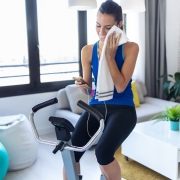Sleeping on the Job: Discover the Health Benefits of Napping
Sometime between 1 pm and 2 pm each day, students, stay-at-home parents, and corporate employees all fight the same battle: staving off mid-afternoon, post-lunch drowsiness. If you’ve ever experienced this, you know it can do a number on afternoon productivity. For most people, the solution is simple: load up on caffeine or an energy drink and power through. It gets the trick done, but is there a better way to cope with afternoon drowsiness?
As it turns out, there is! Recent studies suggest that instead of ignoring those heavy eyelids, you should succumb to them. Or, in other words, take a nap.
Some countries and cultures have an afternoon nap built into their daily schedule. But for most of us, napping is a rare treat—something to be enjoyed on the weekends or vacations. After all, the nine to five schedule doesn’t really leave time for a nap. As research continues to reveal the health benefits of napping, however, this might begin to change. (In fact some companies have already begun experimenting with company-sanctioned napping in the office!)
So whether you’re a nap enthusiast, skeptic, or simply curious, here’s why an afternoon nap might be just what you need.
The Science of Sleep
Sleep is one of life’s basic routines. It’s something everyone does (hopefully) every day. You’ve probably heard that the average adult needs somewhere between seven and nine hours of sleep each night—and that’s true. But why? What’s so crucial about sleep?
It’s a question scientists have researched for decades and they’re still uncovering new information each year. Here’s what is known: Many of the benefits of sleep have to do with the brain, more specifically, with memory and brain plasticity (also called neuroplasticity).
Plasticity refers to your brain’s ability to interpret and respond to stimuli. Basically, when you’re well-rested, your brain can interpret inputs faster. In practice, this might mean reacting to visual information more quickly or simply digesting written information the first time you read it. You know the sluggishness that often follows a poor night of sleep? That is, in part, the result of reduced brain plasticity.
The role sleep plays in memory consolidation is still being explored. Throughout the day, you store countless details, facts, and other information in your brain. It’s not until you sleep, however, that this information is solidified into long-term memories. For decades, researchers believed that memory consolidation occurred during rapid eye movement (or REM) sleep—the final of the four stages. New research suggests this might not be the case.
Because sleep plays such a big role in memory formation and retention, much of the research surrounding napping also deals with memory. But more on that in the next section!
Napping and Memory Retention
If memory consolidation only occurred during REM sleep, naps probably wouldn’t do much for your ability to remember. It takes about an hour and a half of sleep to reach the REM stage—that’s longer than most naps. And though scientists are still exploring the exact relationship between sleep and memory, one thing is clear: a quick nap can do wonders for your memory.
Does this mean taking a nap will help you remember the name of that one kid who sat next to you in first grade? No. But let’s look at the areas of memory napping can help.
Most people are familiar with the concepts of short-term and long-term memory, but that’s only one way to categorize your brain’s storage capacity. Human memory is actually divided into a number of other categories. Item memory, for instance, refers to your ability to recall individual items from a list. Associative memory, on the other hand, refers to your ability to remember things that are paired or linked. Examples include: This face goes with that name; that car is always parked in front of this house—stuff like that.
In studies focused on item memory, napping has no effect on participants’ recall. When individuals take a 90-minute nap, however, their associative memory has been shown to improve.
Napping can even increase your ability to learn and encode new information. In one study, participants were given an associative memory task in the morning and evaluated on their recall. After that morning session, half of the participants took an afternoon nap, half did not. When the participants regrouped in the evening, they were all given another associative memory task and evaluated on their recall. Those who hadn’t napped performed worse than they had that morning—that is, they remembered fewer pairings. Those who had napped—you guessed it—performed better than they did in the morning.
How to Nap Properly: How Long is Too Long?
Like most good things, napping requires moderation. Snooze for too long and you might miss out on some of the health benefits of napping—and negatively impact your nightly slumber.
A good nap should be refreshing, and, as it turns out, short. While there’s no agreed upon “ideal” nap length, most experts suggest keeping naps under an hour and a half—the length of time it takes to reach REM sleep. Some even suggest napping for just ten to twenty minutes. If you’ve ever taken a much needed afternoon nap only to wake up feeling groggy and, frankly, worse than you did before the nap, there’s a good chance you slept too long.
In addition to giving you that groggy feeling, long naps can throw off your sleep schedule, especially if you’re napping later in the afternoon. To get the most from your naps, try to catch those afternoon zzz’s before 3 pm. And always set an alarm. A 20-minute nap may not seem like much, but it might be just what you need to shake off afternoon drowsiness and boost productivity for the rest of the day.
Coffee Naps Aren’t an Oxymoron
Most people drink coffee to help them wake up or stay awake, so you might not think to drink coffee before you nap. Here’s the thing: it takes about 20 minutes for your body to feel the effects of caffeine. And that’s the perfect amount of time to catch a quick nap.
At least that’s the logic followed by proponents of the “coffee nap.” It might seem counterintuitive, but drinking a cup of joe and then immediately settling down for a quick nap can help you wake up feeling more refreshed than if you’d just napped or just had coffee.
The benefits of coffee naps are hard to quantify—after all, it’s hard to measure how “tired” or “refreshed” someone feels. It’s all subjective. That being said, studies have shown that consuming 200 milligrams (mg) of caffeine (about two cups of regular black coffee) and then napping for twenty minutes may help you feel more refreshed upon waking.
Taking Napping to the Extreme: Segmented Sleep
If you’re regularly napping for three or more hours, your sleep cycle might begin to shift from a monophasic sleep pattern—that is, one big chunk of sleep—to a biphasic or even polyphasic sleep pattern. And, depending on your schedule, this might not be such a bad thing.
A biphasic sleep pattern means you’re sleeping in two chunks or shifts, usually for about four hours each. Some scientists believe this is a more natural sleep cycle for humans, as it aligns with the sleep patterns of many other mammals.
With biphasic sleep, the idea is to go to bed when the sun goes down, sleep for four hours, wake up for a few hours of meditation, prayer, reading, etc., and then settle back down for four more hours of sleep. Some people swear by this approach, but unfortunately most of the world is built around monophasic sleep. So biphasic sleep is not the most practical schedule to follow.
Harness the Health Benefits of Napping
Traditional work schedules can make napping difficult, but as more people become aware of the scientific benefits of napping, sneaking some shut-eye on the job is becoming a more mainstream practice. And who knows, maybe this article was the push you needed to finally incorporate an afternoon nap into your daily schedule.
Even if it’s just a 20-minute catnap, an afternoon snooze could change your relationship to work and your daily grind! So why not give it a shot? The health benefits of napping are right there—all you have to do is fall asleep.
References
https://www.hopkinsmedicine.org/health/wellness-and-prevention/can-a-nap-boost-brain-health
https://www.apa.org/monitor/2016/07-08/naps
https://www.mayoclinic.org/healthy-lifestyle/adult-health/in-depth/napping/art-20048319
https://www.sleepfoundation.org/sleep-hygiene/napping
https://www.healthline.com/nutrition/coffee-nap#effectiveness
https://www.medicalnewstoday.com/articles/319425#types-of-sleep-patterns














